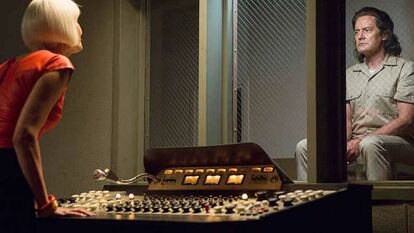Why Episode 8 of ‘Twin Peaks’ is the best thing you’ll watch this summer
The latest chapter in the David Lynch series adds new relevance to the plot of the original

Sometimes, David Lynch loses it: sometimes, one has to wonder if he’s playing a joke at our expense, as he seemed to do in Mullholland Drive, or in the three very long minutes of some guy sweeping up in a bar that he managed to fit into a capital of the new series of Twin Peaks, for example.
Lynch’s problem might be that over the years he has become increasingly removed from the real world. In his last movie, Inland Empire, Lynch would wake up, meditate and then film what the meditation had suggested to him. There is no plot as such: there is some conflict, but it is never resolved, so much as shattered, as though displaying every possible combination. The underlying idea is that in the final analysis, everything is connected. This is how Lynch applies the necessary suspension of disbelief required to watch a movie to real life.
Which is why you should go with your gut feeling rather than using your head when you come up against unrestrained Lynch. Eraserhead or Lost Highway don’t have the classic Hollywood plot structure, and are instead a series of visual emotions. But rather than offering the ephemeral tension of a thriller, they instead provide deeper sensations, beyond the palpable. Anybody who can remember the unsettling sound of Eraserhead will know what I mean.
A quarter of a century has passed since the original and Lynch is further removed from reality than ever
This is exactly what to expect from the new series of Twin Peaks. A quarter of a century has passed since the original and Lynch is further removed from reality than ever. Because the original series is now considered a classic, its creator has been given a free hand. And sometimes, one cannot avoid asking oneself if that was such a good idea. Should somebody have been around to pull him up every now and then, as the channel that broadcast the original so often did?
This is the question that comes to mind time and again during the new Twin Peaks. The character of Doug Jones, for example make no sense (can’t somebody just take him to hospital?). The storyline is sometimes weak and resorts to coincidences to drive the story forward. And if Lynch is hard enough to follow at the best of times, the huge gaps between some storylines, which can be several episodes, make the task harder still.

What’s missing from the original series is that wonderfully provincial, familiar air of Twin Peaks, which, reflected in the quirks and habits of its inhabitants, seems to be the real star of the show. The television channel insisted that the population sign seen at the beginning of each episode read 51,021, because the original 5,120 seemed too small.
But, as said, this is a show that should be watched with the guts and not the eyes. That is where the special stuff begins. Like the thousand-yard stare that Kyle MacLachlan gives his “bad guy” version of Cooper, a character that is radically different from the original, and superbly acted. Or the sequences where Lynch exquisitely plays with time. Or the incredible nuclear explosion in the eighth episode, comparable with the “trip” in 2001, A Space Odyssey and the following plot, which seems a homage to the best of John Carpenter. Because, more than just a series, Twin Peaks is “art in movement” as MacLachlan himself says.
As with the rest of Lynch’s work, the initial conflict in the new Twin Peaks is clear enough. What is not so clear, as with the rest of his work, is that it will be resolved. We should remember that in the original series that Laura Palmer’s killer was revealed under pressure from the channel, and against Lynch’s wishes.
But with Lynch, everything can take an unexpected turn at any moment. In the last episode, the eighth, more is suggested than was originally intended, and ends up giving new relevance to the plot of the last two episodes in the original.
This is, without doubt, the best of the series so far, and the best you’ll see in a long time… if you manage to survive the seven previous hours of Lynch at his least restrained
English version by Nick Lyne.
Tu suscripción se está usando en otro dispositivo
¿Quieres añadir otro usuario a tu suscripción?
Si continúas leyendo en este dispositivo, no se podrá leer en el otro.
FlechaTu suscripción se está usando en otro dispositivo y solo puedes acceder a EL PAÍS desde un dispositivo a la vez.
Si quieres compartir tu cuenta, cambia tu suscripción a la modalidad Premium, así podrás añadir otro usuario. Cada uno accederá con su propia cuenta de email, lo que os permitirá personalizar vuestra experiencia en EL PAÍS.
¿Tienes una suscripción de empresa? Accede aquí para contratar más cuentas.
En el caso de no saber quién está usando tu cuenta, te recomendamos cambiar tu contraseña aquí.
Si decides continuar compartiendo tu cuenta, este mensaje se mostrará en tu dispositivo y en el de la otra persona que está usando tu cuenta de forma indefinida, afectando a tu experiencia de lectura. Puedes consultar aquí los términos y condiciones de la suscripción digital.








































